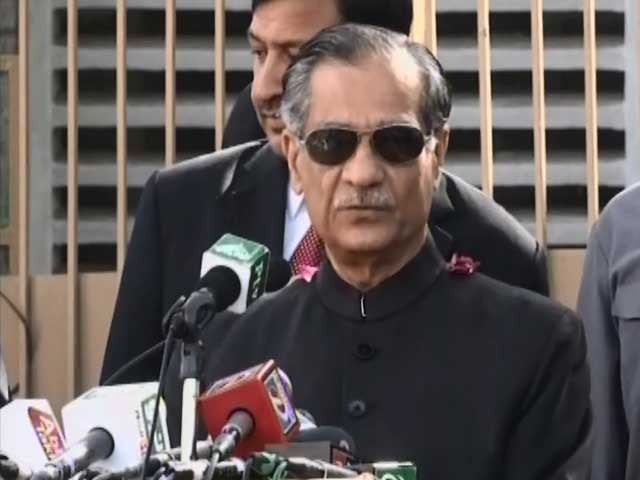Water is life: A decade on, Mauripur's water treatment plant inaugurated
Rehabilitated on orders of the judicial commission, CJP visits Karachi for inauguration of TP-III

CJP Mian Saqib Nisar: PHOTO:EXPRESS/FILE
The restoration and extension of TP-I at Haroonabad, TP-II and TP-III at Mauripur had to be completed by 2015, under the Sewerage-III project, after work started in 2013.
However, the project director, Noor Ahmed Samoo, had told The Express Tribune that S-III started facing delays from 2008 when the three Karachi Water and Sewerage Board treatment plants became inactive. The delay was due to a conflict over the S-III budget between the federal and provincial governments.
There was further delay in the work due to the negligence and incompetence of KWSB, Samoo had said.
Addressing the ceremony, the CJP lamented that the sea was being polluted, which was dangerous.
CJP denies running 'anyone's campaign' while visiting Rawalpindi hospital
Justice (retd) Amir Hani Muslim, the head of the judicial commission, welcomed the CJP to the ceremony where Sindh High Court Chief Justice Ahmed Ali Sheikh, Inspector-General Amjad Javed Saleemi, Chief Secretary Azam Suleman Khan and other officials were also present.
"Life cannot be imagined without water and we need to value it for a better Pakistan," said Justice Nisar, adding that provision of water was vital to save the next generation.
TP-III will clean 77 million gallons of dirty water daily and be a source of clean water to Malir, Korangi, Haroonabad and Mauripur.
According to the water board officials, Mauripur's TP-III previously had a capacity of 54MGD of water, which has now increased to 77MGD. The treatment plant's total capacity is 180MGD of water.
The total cost of the plant was more than Rs36.117 million. The federal and provincial governments contributed equally to the project.
The CJP noted that springs of water were flowing in Gilgit-Baltistan. "The people of Gilgit are happy over the construction of the Diamer-Bhasha dam."
He shared that several meetings were held over the dam and it was agreed that Pakistan was nothing without water.
Department of Plant Protection operates with ‘contractual’ DG
Commenting on the condition in Karachi, the CJP expressed delight over the cleanliness in the city, saying that all the roads he passed by appeared to be clean. He added that the city had improved compared to what it was like six months ago.
Proud of Justice (retd) Muslim's accomplishment, the CJP said he had not disappointed the nation as he had kept the integrity of the Supreme Court intact.
"A huge task has been completed today which will help clean the polluted environment of the city," the chief secretary said, adding that the targets given by the water commission had been fulfilled.
"Three treatment plants have been installed in Karachi. The funds were provided by the federal and provincial governments," he said, adding that the project's next phase will be completed by 2019. He said they were determined to not dispose even a drop of water into the sea without treatment.
Project director Samoo acknowledged that Karachi faced a huge environmental issue. He informed that 472MGD water was being disposed into the sea without treatment and more than 90MGD of industrial waste was being disposed into the sea. He said that 400MGD of water was being treated at three water treatment plants.
Commenting on the restoration of TP-I, Samo said it will be made functional by December, 2018.
What is the S-III project?
The S-III project, to be completed by 2020 under KWSB's supervision, promises a combined filtration capacity of 460MGD of water.
The project has been divided into two phases with the first phase estimated at Rs21.31 billion and the second at Rs14.79 billion. Phase I of the project involves a 33.32 kilometre extension of a pipeline and conduit installation in Lyari River's basin. The system will be linked to TP-I at Haroonabad and TP-III at Mauripur. TP-I entails treatment capacity for 100MGD while TP-III has a capacity of 180MGD.
Industries without treatment plants will be sealed, warns judicial commission
Phase II covers installation of a trunk sewage system extending to 22.74km in the Malir River basin. The system will be linked to the TP-IV in Korangi. Meanwhile, TP-IV will have a capacity to filter 180MGD of water daily.
As per the feasibility report of S-III, restoration work of TP-I will be completed by January, 2019 while work on the extension of 100MGD capacity will start by December, 2019.
KWSB officials had confirmed that 95% of the conduit work was completed between Yaseenabad to Mauripur while work between Yaseenabad and Surjani Town will start by September this year.
*Additional reporting by Syed Ashraf Ali


















COMMENTS
Comments are moderated and generally will be posted if they are on-topic and not abusive.
For more information, please see our Comments FAQ